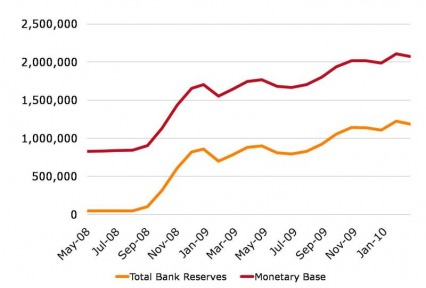Asset Purchases and Bank Reserves

In $thousands
Dealing with the enormous amount of asset purchases it made is the primary concern of the Federal Reserve because of the dramatic increase in reserves and the money supply that resulted from such transactions. This increase could potentially expose the economy to high inflation rates in the future if it is not dealt with properly. For months, the Federal Reserve has focused on developing various methods to dispose of the securities it currently holds in order to reduce the amount of bank reserves in the financial system. This will decrease the supply of funds in the money markets so that the Federal Reserve can more effectively control financial conditions via interest rates on those reserves as well as other short-term rates.
One such method is reverse repurchase agreements, also known simply as reverse repos. During this process, the Federal Reserve sells a security to a counter-party (i.e. a bank) with an agreement to repurchase that security at some date in the future. When the counter-party pays for the security, it has the effect of draining an equal quantity of their reserves from the system. This has been done by the Federal Reserve in the past as a means of reducing bank reserves. More recently, the Federal Reserve has developed a method to be able to operate in a three-party repo market, enabling it to use reverse repos to absorb substantial amounts of reserves. To futher this ability, the Federal Reserve is currently seeking to expand the group of counter-parties with which it can transact using its vast holdings of MBS.
The Federal reserve may also choose to redeem or sell its securities as a method of monetary restraint. However, Federal Reserve Chairman Ben Bernanke has stated that he does not foresee the Federal Reserve selling any of its security holding in the near future and will allow agency bond and MBS to run off as they mature or are prepaid. Only once the economic recovery proves sustainable will the Federal reserve being to gradually sell its securities currently held. Additionally, the Federal Reserve is in the process of developing term deposits for banks. These would be very similar to certificates of deposit that banks offer their customers and would have the effect of keeping some of the reserves idle for a period of time.
Back to Exit Strategy
One such method is reverse repurchase agreements, also known simply as reverse repos. During this process, the Federal Reserve sells a security to a counter-party (i.e. a bank) with an agreement to repurchase that security at some date in the future. When the counter-party pays for the security, it has the effect of draining an equal quantity of their reserves from the system. This has been done by the Federal Reserve in the past as a means of reducing bank reserves. More recently, the Federal Reserve has developed a method to be able to operate in a three-party repo market, enabling it to use reverse repos to absorb substantial amounts of reserves. To futher this ability, the Federal Reserve is currently seeking to expand the group of counter-parties with which it can transact using its vast holdings of MBS.
The Federal reserve may also choose to redeem or sell its securities as a method of monetary restraint. However, Federal Reserve Chairman Ben Bernanke has stated that he does not foresee the Federal Reserve selling any of its security holding in the near future and will allow agency bond and MBS to run off as they mature or are prepaid. Only once the economic recovery proves sustainable will the Federal reserve being to gradually sell its securities currently held. Additionally, the Federal Reserve is in the process of developing term deposits for banks. These would be very similar to certificates of deposit that banks offer their customers and would have the effect of keeping some of the reserves idle for a period of time.
Back to Exit Strategy
